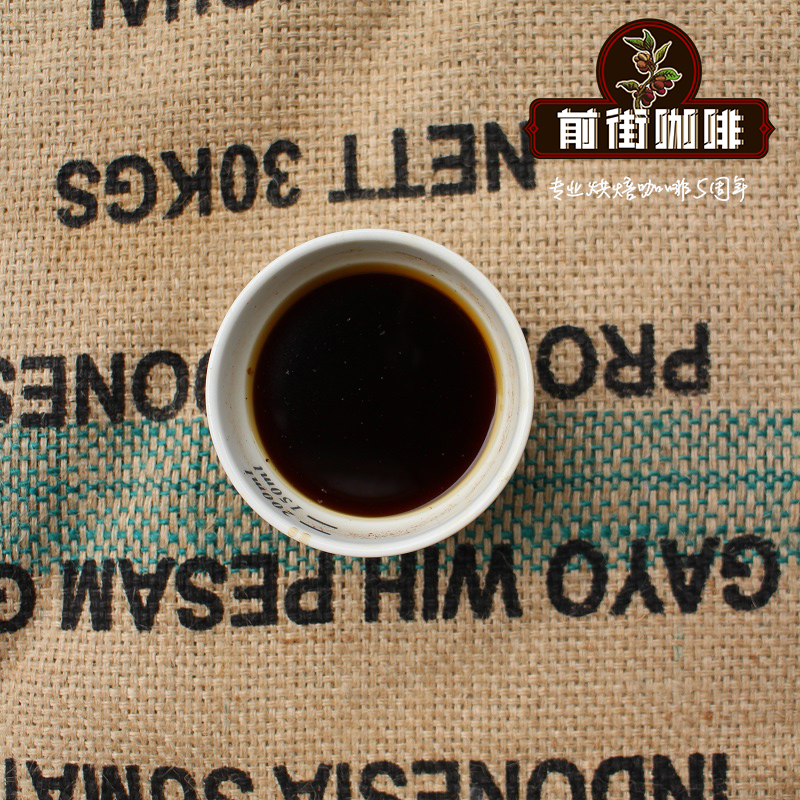Insufficient coffee extraction? Superb? How to know by tasting?

Professional coffee knowledge exchange more coffee bean information please follow the coffee workshop (Wechat official account cafe_style)
This article will be linked by the basic theory of coffee extraction and the tasting of coffee in three cases: "over-extraction", "under-extraction" and "ideal extraction".
Extraction can be said to be the most important but least understood part of coffee brewing. Extraction represents everything. If you can't even get a cup of coffee without extraction, here's the simplest but not 100% accurate statement:
Extraction is the use of water to bring out the substance of coffee.
It's easy to talk, but it's much harder to integrate and apply.
Instead of discussing in depth the effects of coffee oils and trace components during extraction, we will first discuss more practical and appropriate information, such as how to taste extracted coffee and be proficient, as for chemical analysis later.
A lot of things happen when coffee is mixed with water, and the easiest thing to understand is that the water dissolves a lot of the flavor of coffee, which is almost the flavor you drink in the coffee cup. Only very fine coffee powder will affect the taste, but the fine powder is not considered in the extraction, because the fine powder only floats in the water during the extraction.
Roasted coffee beans contain about 28% by weight and can be dissolved in water, which means that about 28% of the substances in roasted coffee beans can be extracted into the water. Almost all of the rest is the fiber of coffee beans and the tissue of seeds. Water is a good medium for soluble matter, but it still needs some external help. If you throw the whole coffee bean into hot water, the extract is much less than the powder, because the structure of the coffee bean is very dense and complex. Water cannot pass through the whole coffee bean and dissolve the taste. So we must increase the surface area of coffee beans and "open it" so that the water can bring out the taste of coffee. Coffee beans can be easily extracted by using a bean grinder, the coffee beans can be ground into powder, and the surface area can be increased so that the water can be effective.
Ideally, we grind the coffee to a very fine state, throw it into the water and dissolve it to give a good flavor. Unfortunately, if you do so, this is a very bitter and terrible cup of coffee. Not all coffee flavors are good, so we have to control the number of flavors extracted in order to brew a delicious cup of coffee.
Similarly, we can't grind a lot of coffee beans and extract a little bit. In order to avoid these overextracted flavors, under-extracted coffee tastes just as scary (sometimes worse than over-extraction). Most people understand that extraction is like a two-way road, and we always try to find a balance in this way to avoid over-extraction or under-extraction.
1. Coffee with insufficient extraction
Insufficient extraction means that there are not enough coffee powder substances brought out by water, and there are many residual substances in coffee powder, which can increase the flavor of this cup of coffee. Imagine a cup of espresso with a short extraction time, that is, a boutique Italian concentrated ristretto, with a smelly sour taste, a lack of sweetness, a strange salty taste and a disappointing finish. These four features are obvious signs of insufficient extraction. Let's take a closer look at the phenomenon of insufficient extraction.
Stinging sour taste
The sour taste of coffee is tricky, especially when you expect it to be sour. Many people ask the author, "isn't sour sourness the same as sour acidity?" This is a good question; many languages use the same words to express sour as sour, and you can imagine how difficult it will be when people who speak different languages are tested together.
In order to clarify this part, the stinging taste is defined as a negative taste. The tongue will feel sour quickly and strongly, which can cause an immediate physiological reaction. You may wrinkle your lips or have electrocuted, sharp feelings on both sides of the tongue. The sour taste can be uncomfortable and spoil your sense of taste, and it won't be the taste you want.
When it comes to acidity, it can be good or bad, and it is more like a kind of flavor than good or bad. For example, "the acidity of coffee is pleasant", or "this coffee has a high acid strength" is logical. Acidity can be linked with sour / juicy / sour bright / irritating acidity, and you can write a sour article, but this article is about extraction. Let's get back to business.
Lack of sweetness
From the author's point of view, the most important thing about coffee flavor is sweetness. Sweetness is the best. Have you ever heard anyone complain like that? " This espresso is too sweet! " . Let's think about it. I'm sure we should all be pursuing the sweetness of coffee. Sweetness is like the Holy Grail that is hard to find, and once sought, there will be an amazing reward! Insufficient extraction will not have a sweet taste, and it is far apart. Insufficient extraction will show the dissatisfaction after drinking coffee, which makes people feel as empty as I want more coffee. It is worth mentioning that the lack of sweetness can highlight the sour taste of coffee beans, making people more obviously feel the lack of extraction.
Salty taste
At present, not everyone agrees with the author, but this part must insist that under-extracted coffee will be salty. It's not as salty as "I'm sorry I added salt to the coffee", but almost all underextracted coffee tastes like it does when it's salty. From a tactile point of view, it's like being slippery in contact with alkaline food (please don't drink Amonia to feel the taste, believe me).
# Science Lecture-sour and salty tastes dissolve more easily than sweetness, which is why underextracted coffee has sour and salty tastes, and sweet substances do not have enough time or opportunity to dissolve completely.
Yu Yun is short.
The aftertaste of a well-extracted coffee can last for several minutes (or even a few hours of luck). You can imagine someone putting a piece of brown sugar on your tongue, or imagine that you have just eaten a delicious taffy.
The underextracted coffee does not have this aftertaste. When you swallow the coffee, the flavor dissipates. There is no pleasant feeling left in your mouth, which makes you experience the short and unsatisfactory taste of this cup of coffee, which is bad and not delicious.
There are other bad feelings that represent insufficient extraction, but the above four items are more obvious and definite. Whenever you drink these properties, you can be sure that you are drinking coffee that is not sufficiently extracted.
Next, let's look at the other extreme of insufficient extraction.
Second, over-extracted coffee
The over-extracted coffee represents bringing out too much soluble matter in the coffee, and the result of this extraction is a bad flavor.
Imagine a boutique espresso with an extraction time of 40-50 seconds. Don't pretend you haven't tasted this exquisite coffee. This kind of coffee can be bitter, dry and empty. These are the three most obvious characteristics of over-extracted coffee. Let's take a look at these characteristics again.
Bitter taste
We have all had bitter coffee. The over-extracted coffee is really bitter. I don't want to have such a bitter taste unless I'm drinking Kimberly bitterness. Much of the bitterness comes from caffeine, but bitterness is also related to many other chemicals. Deep-roasted coffee will reach a charred state and form more bitter chemicals.
# Science Lecture-there are thousands of chemicals (mostly poisons) that trigger bitterness signals in our taste buds, warning our bodies not to eat them.
Dryness
It is very uncomfortable to drink dry coffee in coffee, because the feeling of dryness is very strong and will last for a long time. This feeling is called astringency, just like you drink unsweetened black tea, new wine, overbrewed white wine. The astringency in wine comes from the polyphenol effect: this is a chemical that is easily found in plants, seeds and bark, and it may also be a chemical that makes coffee feel dry.
Polyphenols are bitter and bind to the proteins in your saliva. As most people know, polyphenols dry your tongue and produce a rustling or dry feeling in the mouth (this should not be confused with "crisp" or "dry" in wine. These adjectives indicate distinct acidity or low sweetness, not necessarily taste)
Emptiness
The author likes to use emptiness to describe over-extracted coffee. Coffee feels empty and lifeless, just like extracting the light from the coffee, killing the beautiful substance in the process. Well-extracted coffee will make you feel full-bodied, delicious, smooth and mouth-watering. And over-extracted coffee is empty, rough, disgusting and tasteless. It is this kind of coffee that lacks flavor and characteristic (this characteristic does not refer to the characteristic of flavor), which makes the author use the word empty to describe it.
These are the flavor characteristics of overextracted flavor, and of course there are more adjectives, but these are the easiest to recognize, which also reminds you not to flush out overextracted coffee.
The most important thing about these empty flavors is that they are common and can be extracted from the noblest rose summer coffee in the world, as well as from inferior bad coffee. These flavors are not pleasant. Most of the people who read this article pursue fine coffee, which means that we are trying to create special coffee for consumers, so that consumers will be willing to spend more money to taste it, and the mistake of insufficient extraction is so sudden.
Now let's take a look at the good ingredients, reaching the sweet spot and delicious coffee.
Third, coffee with good extraction
Some of the coffee that is well extracted is hard to come by. People put a lot of effort into balancing countless causes, just to create a cup of coffee with a good flavor, and we have to know how this coffee tastes.
Imagine the best coffee you've ever had, with a sweet and mature flavor! The clear flavor is like transparency. Acid balance and bring a positive feeling, if you are lucky, the acid will be very rich, and the aftertaste will be long. This is the coffee that everyone is flocking to, and you will want to know more about it.
Sweetness and maturity
The author spent countless hours trying to extract more of the coffee's most mature flavor from the coffee.
Imagine plums or similar drupes ripening with rich and strong acidity at first, then sweeter and sweeter as they mature, and the sugar of the fruit develops and becomes thicker, thicker, and even greasy. And then reach a point, like the sweetness you smell when you hold the fruit close to your nose. This is the sweet and mature flavor you will want to drink from coffee, and if you have never had such coffee, you may easily be satisfied.
Clarity and transparency
Describe the coffee treatment as: "peep coffee from the coffee window", and the author likes to extend this sentence to "imagine extracting and baking into other panes of the coffee window". If the coffee in your cup is overextracted or underextracted, it will be difficult to "see" the actual flavor of the coffee. Common extraction mistakes can distract you and waste the painstaking front-end processing of the coffee you taste.
Acid quality
Meticulous, rich and distinct acidity is the most important element on the back of coffee. The acidity is intoxicating but also frustrating. When you drink coffee, the acidity reminds you of certain fruits or even wine. If the acidity can be clearly defined, you can focus on remembering the last time you ate the fruit.
The above is the coffee extraction and flavor is good, bad or worse, it is expected that now you can pay attention to the coffee you drink, and be able to link to the coffee properties of different extraction results.
Important Notice :
前街咖啡 FrontStreet Coffee has moved to new addredd:
FrontStreet Coffee Address: 315,Donghua East Road,GuangZhou
Tel:020 38364473
- Prev

It's not coffee, it's art! Super show off to break your imagination!
Professional coffee knowledge exchange more information about coffee beans please follow Miss Coffee Workshop (official Wechat account cafe_style) the hot latte you ordered! With the hot latte served on the table, it caused a burst of exclamations all over the table: "how cute!" the white foam on the coffee made a lovely cat, and cleverly drew the eyes, beard and ears with different colors, and along with the cup.
- Next

Will coffee flower-pulling make coffee taste better? (above)
Professional coffee knowledge exchange more coffee bean information Please follow the coffee workshop (Wechat official account cafe_style) likes to pull flowers not only to take good pictures, but also to add milk sweetness and fullness to the coffee. But does pulling flowers really make coffee taste better? Imagine walking into a coffee shop affected by the "third wave of coffee" and ordering a cup of white coffee (flat white).
Related
- What is the meaning of lactic acid fermentation with coffee bean treatment?
- How to judge the state of foam by sound?
- How does the latte pull out the unicorn pattern? Come to get for a little trick to improve the flower pull!
- Will flower pulling affect the taste of the latte?
- Do you know the history of coffee?
- The difference between honey treatment and sun washing what is raisin honey treatment?
- What kind of milk can a novice use to make coffee foam to keep the foam longer? The correct method and skills of milking tutorial sharing
- Why do washed coffee beans taste sour? Flavor characteristics of washed Coffee
- Introduction to the skill of how to practice the size and height of water injection around the circle of hand-brewed coffee
- How do beginners practice coffee flower drawing from scratch?

